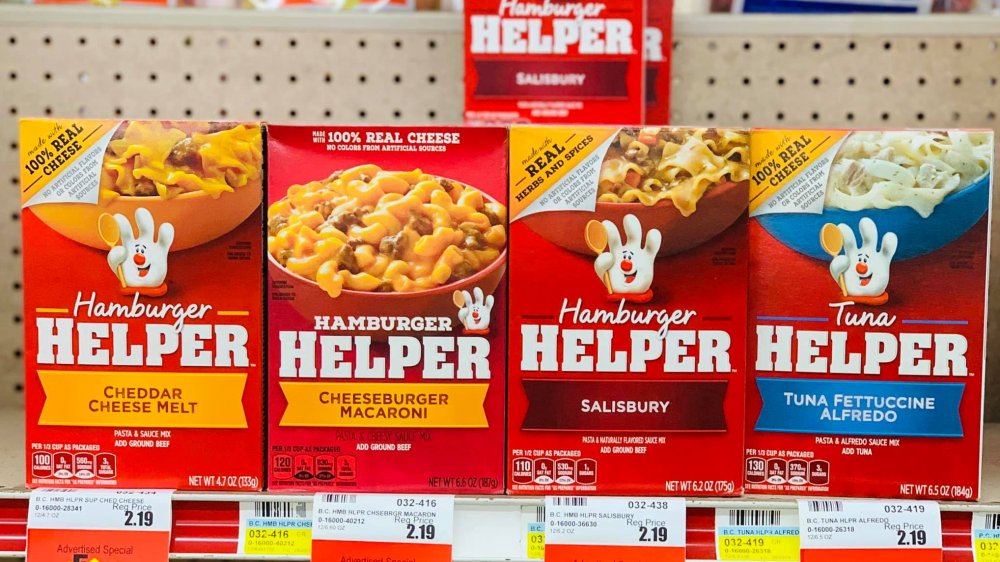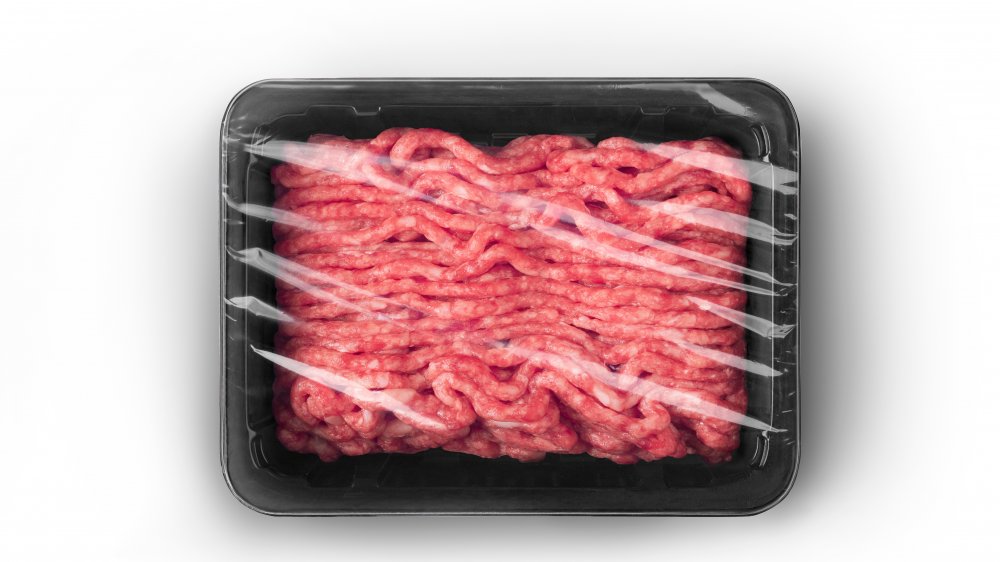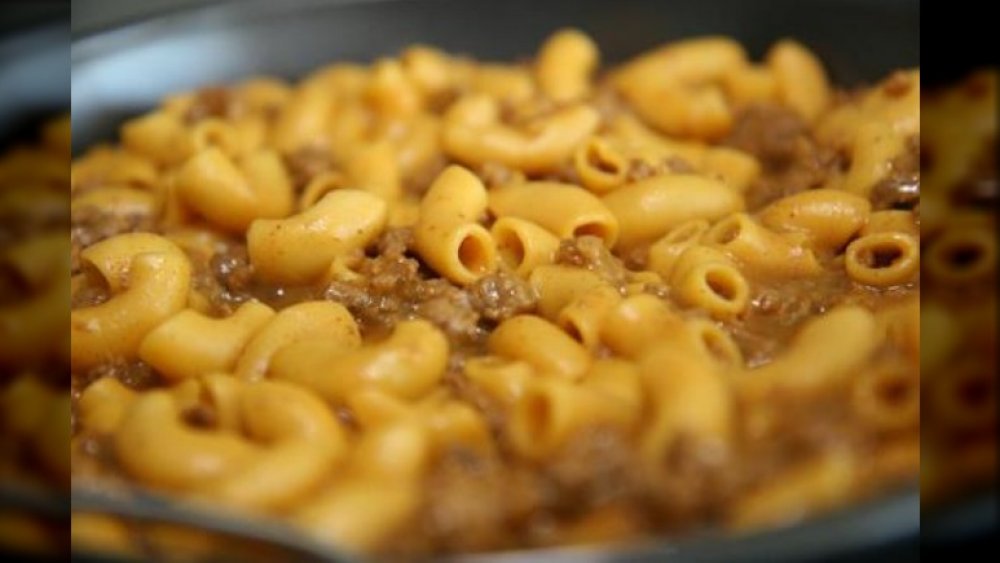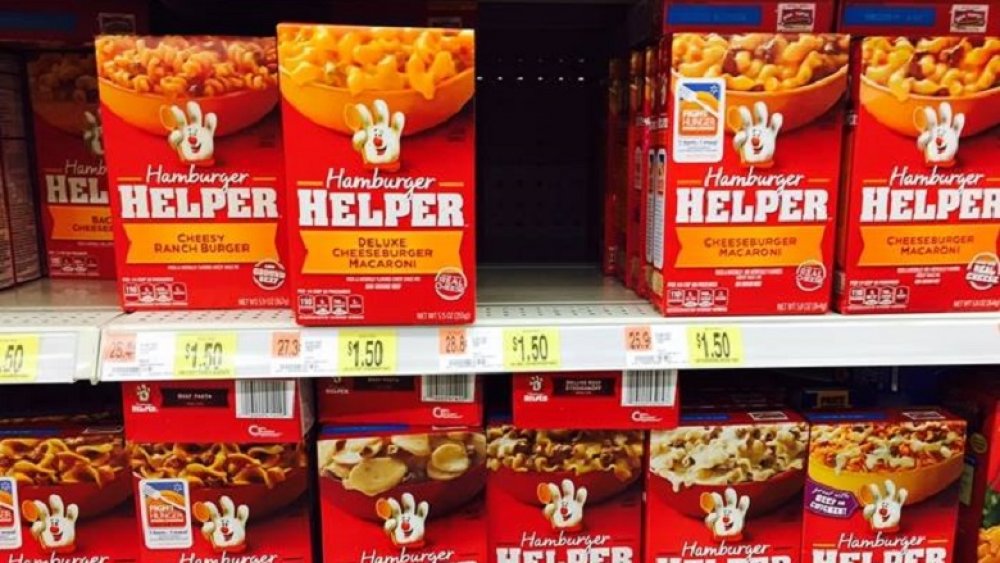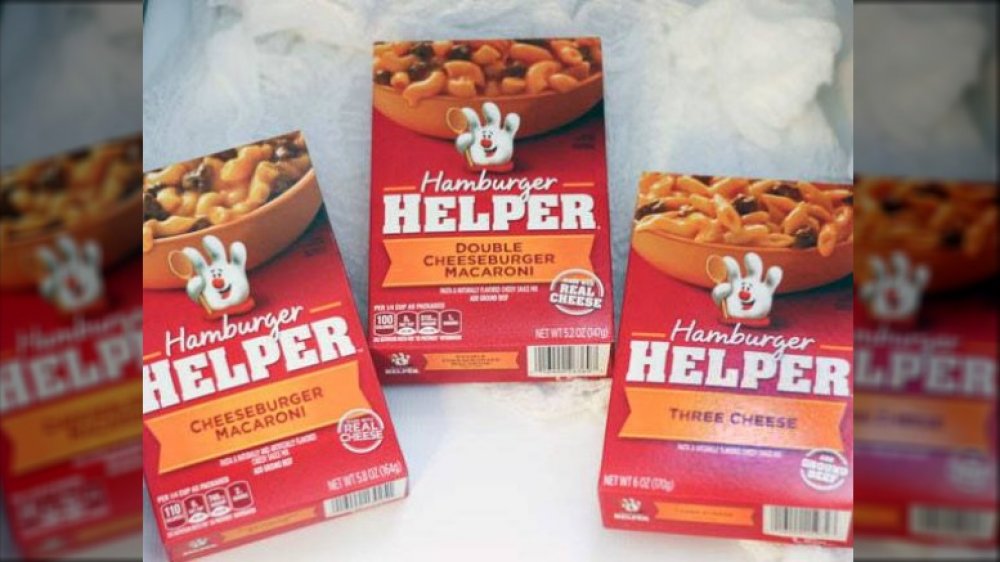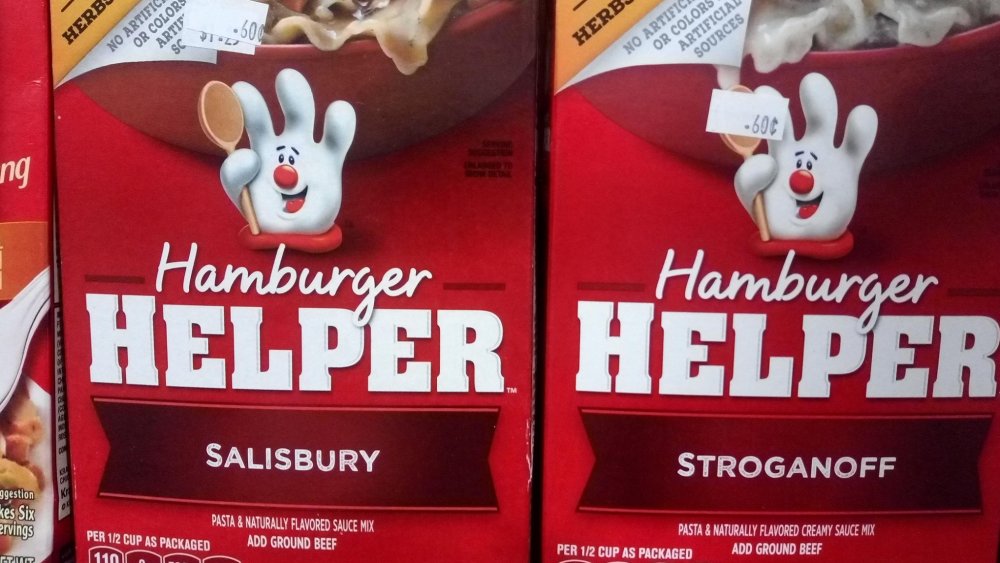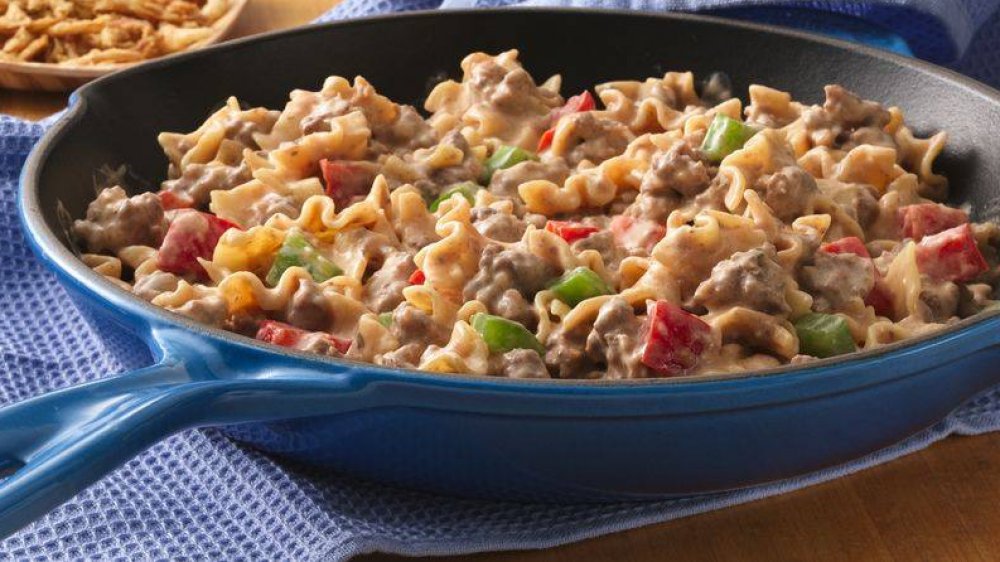The Untold Truth Of Hamburger Helper
We've all been there. It's closing in on 7 p.m. on a Tuesday, and the last thing you want to do after a long day at work is cook up a meal that requires any effort. And sure, if it was just you at home, maybe you could get away with something quick and easy like a sandwich or a salad, but with a full house and other hungry people to feed, you need a solution. As it turns out, people have been turning to Hamburger Helper in the same situation for decades, whipping up a meal in just 1-2-3.
But it does make you wonder — what even is Hamburger Helper? What's the story behind this pantry staple, and where did it come from? Whether you're looking for a non-perishable food item to stock up on, or you're just running to the store for a quick dinner idea, this might just be the answer. But you may want to know more before grabbing for that familiar red and white box. To learn a bit more, we took a deeper dive. This is the untold truth of Hamburger Helper.
Hamburger Helper was introduced during a beef crisis
When there's a food shortage, consumers tend to grasp at straws, searching high and low for a solution to their problem. And that's exactly what Hamburger Helper was when it got its start — a solution. According to General Mills, America's weakened beef economy in the 1970s led to the launch of Hamburger Helper as a promise to stretch people's dollar (and their beef) further.
A meat crisis in 1972, caused by a change in the population of anchovies, drove up the cost of beef even more. As it turns out, farmers were relying on the anchovies as animal feed, and as less were in the supply chain, feed prices increased, causing beef prices to skyrocket.
With the rise in beef prices, even more American families were introduced to their new best friend — Hamburger Helper — which helped them to use just one pound of beef, paired with the box mix, to put dinner on the table for their family.
Hamburger Helper was an instant success
Hamburger Helper was the solution to a problem in the 1970s. And for most families, they found it to be a delicious solution. When Hamburger Helper was introduced, with five flavor options consisting of Beef Noodle, Potato Stroganoff, Hash, Rice Oriental, and Chili Tomato, it was kind of a no-brainer for people to utilize the pantry staple at the time.
Betty Crocker had introduced similar boxed meals in 1967, but those boxed dinners required the hamburger to be browned in one pan, while the noodles needed to be cooked in the other. Hamburger Helper allowed home cooks to prepare dinner with ease, throwing it all in one pan, and it instantly caught on. According to General Mills, 27 percent of households within the U.S. added Hamburger Helper to their pantries within its first year on the market, turning it into the regular stocking-up staple we know today.
General Mills did an entire relaunch to help Hamburger Helper
As with most new products, fame and fortune don't last for long without some ingenuity. After decades on the market, it's not surprising that Hamburger Helper began to see a decline in sales — especially with all of the boxed food competition that's emerged since its inception. But General Mills wasn't letting go that easy. The company took an entire year to plan the pantry staple's makeover, relaunching the brand in 2013 after 42 years.
First thing's first, the name was changed from its 1970 original 'Hamburger Helper' to just 'Helper.' According to Yahoo! Finance, the name change came as the company was featuring other versions of the product, including options for chicken and tuna, along with the beef staple (thanks to a decline in the popularity of beef).
The packaging was completely revamped, designing it with the bold red and white color palette recognizable today. General Mills CEO, Ken Powell told StarTribune at the time, that Hamburger Helper wasn't doing enough to really refresh the products over the years prior to the relaunch, so it was time for a bold move.
A marketing plan was launched aimed at single men
As the brand leaders behind Hamburger Helper began to look at ways to save its fading appeal, changing their target demographic was part of the strategy in 2013. Long gone were the days of female homemakers and working moms being the only targeted buyer.
According to Yahoo! Finance, General Mills found that more young men were buying the product, so they decided to capitalize on that trend. "A lot of marketing efforts are just beginning," company spokesman Mike Siemienas told Yahoo! Finance in 2013 in regards to a social media campaign directed at men aged 18 to 30. Prior to the campaign, Hamburger Helper didn't have a Facebook page, so the company launched it in December 2012 to prep for its new rebranding program. The goal was to introduce singles and young parents in their 20s to the meal solution, providing a full meal with just one pound of ground beef and a box of Helper.
Hamburger Helper contains a ridiculous amount of sodium
As quick and easy of a meal solution that Hamburger Helper is, it does make you wonder what exactly is in that box. When a consumer utilizes a box of Hamburger Helper, they're combining the provided boxed ingredients with hamburger meat, milk, water, and sometimes butter. Sounds pretty simple, right? But when you dive into what the ingredients provided in the box actually are, you may end up consuming close to your daily recommended amount of sodium.
According to Livestrong, the mixes contain between 580 to 810 milligrams of sodium per serving, and that number increases once the meal is prepared with the corresponding ingredients, bringing you up to as much as 990 milligrams per serving. And if you're eating Hamburger Helper in small quantities, this may be okay, but chances are you're only splitting the box in a few ways, causing that sodium count to go up even higher.
According to the American Heart Association, adults should consume close to 1500 milligrams of sodium per day. So how close is that one heaping serving bringing you to that daily recommendation?
There are so many flavor options
Hamburger Helper has certainly come a long way since making its national debut in 1971 with its five original flavors. For one, it's not just all about the hamburger now. According to the product website, there are 24 options of Hamburger Helper, with flavors including everything from Philly Cheesesteak to Four Cheese Lasagna and Cheesy Enchilada. Of course, hamburger isn't the only meat option, either. The brand boasts five varieties of Tuna Helper, pairing the mixture with canned tuna, along with three varieties of Chicken Helper to pair with boneless chicken breasts.
But even with all of those flavors, of course, there are some that prevail. According to a vote on Ranker, the Cheeseburger Macaroni flavor of Hamburger Helper is an all-time favorite, with Stroganoff falling in second place. The HoustonPress, however, put Cheeseburger Macaroni in fifth place, with Stroganoff placing first.
One fan took to Reddit to share their love for Cheesy Enchilada and Double Cheeseburger Macaroni, saying they're "hands down the best." But for many, it may all just depend on personal preference, the flavors you're used to eating around the family dinner table, or the ones you were raised on that give you a bit of nostalgia.
You can keep Hamburger Helper on-hand for a long time
Hamburger Helper can sure come in handy for a lot of things. It was useful for families during a beef crisis to continue putting hearty dinners on the table. And, it's useful for singles in their 20s looking for something quick and easy to whip up. But perhaps most importantly, it's an ideal standby to have on-hand in your pantry when you need to grab something quick and easy for a meal.
And luckily, that little red and white box can last in a pantry for quite some time. The ingredients list for the majority of Hamburger Helper products include enriched elbow macaroni, corn starch, salt, wheat flour, sugar, modified whey, along with multiple seasonings and flavors. Included in that list is also citric acid and sodium phosphate, both of which act as a preservative, extending a product's shelf life. And while packages do offer a best by date (that's usually pretty far out), chances are, it'll be safe in your pantry for quite some time.
A box of Hamburger Helper was listed for $8,100
In comparison to most meals, the price of Hamburger Helper is pretty low. And really, that's kind of the point. You're certainly not going to break the bank buying this packaged staple to help feed your family or yourself. But one man decided to list a box he had for way more than the market cost.
Timmy Solar decided to post his box of "Antique Hamburger Helper" for $8,100 on Facebook Marketplace. And while Salisbury is a popular flavor, there was no way Solar actually believed he'd get that much cash for the dish.
"It's not really an antique," Solar told KTEM News. "I found it in a cupboard in an apartment I moved into. I posted it as a joke..." And while the box that was only three years past its pantry prime received plenty of comments and laughs, it definitely didn't sell for that much. In fact, Solar threw it away not long after the posting.
There are hacks to make Hamburger Helper even better
The majority of Hamburger Helper mixes call for the same ingredients. To whip up this pantry staple, you'll need ground beef, hot water, butter, and milk. And luckily, each box comes with its own individual flavorings, adding a bit of pep to the meal. But luckily, there are even more ways to spice it up.
Hamburger Helper offers helpful tips on its website and packaging suggesting add-ins for each flavor, like cooked bacon, shredded cheese, and fresh tomatoes for its Cheeseburger Macaroni, or chopped green chiles and salsa for its Southwest Pasta. But those aren't the only clever ideas for mixing it up.
One Chowhound thread received a flood of ingenious ideas, suggesting home cooks add things like pepperoni, Italian spices, and mozzarella or mushrooms and onions to the mix. Adding additional ingredients, throwing in a few veggies, or even baking the dish topped with cheese can really take this boxed staple to a new level.
The Hamburger Helper mascot dropped a mixtape
Staple foods that have been around for years certainly make themselves recognizable through their mascots. You know that when you see Tony the Tiger, you think of Frosted Flakes. Or, see the Pillsbury Dough Boy and think cookies, croissants, and biscuits. Hamburger Helper's mascot, Lefty, introduced in 1977 does the same trick. But that cute little red-nosed, white-gloved hand apparently has some hidden talents.
Lefty dropped a mixtape in 2016 as a creative marketing technique for the brand — as well as a very elaborate April Fool's Day joke.
It all started from a 2014 Tweet meant as a joke, dropping hints about a mixtape, and the response was astounding, with over 10 thousand retweets. And with the help of a student team from McNally Smith College of Music in St. Paul, Minnesota, along with video production students from the Minneapolis College of Art and Design (MCAD), the mixtape was launched, showcasing five original songs created by established artists, along with the clever students from McNally Smith and MCAD. Lefty starred in two music videos, even garnering the attention of Billboard, stating that Lefty was the hottest new rapper on the scene at the time.
